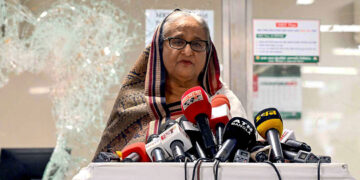Prime Minister Sheikh Hasina Steps Down Amid Violent Protests
In a dramatic turn of events, Bangladesh’s Prime Minister Sheikh Hasina has resigned amidst escalating violence and widespread protests, plunging the nation into political uncertainty. Hasina’s resignation follows weeks of intense demonstrations, primarily led by students, that have left hundreds dead and many more injured.
Background of the Unrest
The protests began as a movement against the partial reinstatement of civil service recruitment quotas favoring supporters of the ruling Awami League. These quotas, seen as a symbol of government corruption and favoritism, ignited widespread discontent among the youth and the general population. Over time, the protests evolved into a broader call for democratic reforms and Hasina’s resignation.
Key Events Leading to the Resignation
- Massive Protests and Violence: On the eve of her resignation, over 90 people were killed in clashes between protesters and police, adding to the death toll of 280 since early July. Demonstrators set fire to government buildings, police stations, and even the Mujibur museum, causing widespread chaos across Dhaka and other cities (UPI).
- Storming of Hasina’s Residence: Thousands of protesters breached the gates of the Prime Minister’s residence in Sher-e-Bangla Nagar, Dhaka, symbolizing the peak of public outrage. The military and police forces were overwhelmed, leading to a significant shift in the political landscape (DW) (UPI).
- Military Intervention: General Waker-uz-Zaman announced the formation of an interim government and urged the protesters to cease violence. The military’s intervention was crucial in Hasina’s decision to step down, as they promised to address the protesters’ demands and restore peace (DW) (UPI).
Hasina’s Departure
Fleeing to India via helicopter, Hasina arrived at a military airbase near Delhi. Unconfirmed reports suggest she might be heading to London for exile. Her son, Sajeeb Wazed Joy, stated that she resigned for her safety, emphasizing her contributions to Bangladesh’s development. He expressed disappointment over the accusations of corruption and authoritarianism against her (UPI).
Reactions
- International Response: British Prime Minister Keir Starmer and other global leaders have called for the protection of democratic processes and the right to peaceful protest. The international community is closely watching the developments in Bangladesh, urging a swift return to stability and democratic governance (UPI).
- Local Impact: Despite an evening curfew, protests continued in Dhaka with incidents of arson and looting. The resignation has created a power vacuum, raising concerns about the immediate future and the potential for further unrest (UPI).
Future Prospects
The interim military-led government faces the daunting task of restoring order and addressing the protesters’ grievances. The support of the international community will be crucial in guiding Bangladesh through this transitional period and ensuring a return to democratic governance.
Conclusion
Sheikh Hasina’s resignation marks a pivotal moment in Bangladesh’s history. As the nation navigates this turbulent phase, the focus will be on achieving stability, addressing public demands, and ensuring a democratic and peaceful future.
Sources:
- UPI
- The Independent
- BBC
- Image: The Times of Israel











